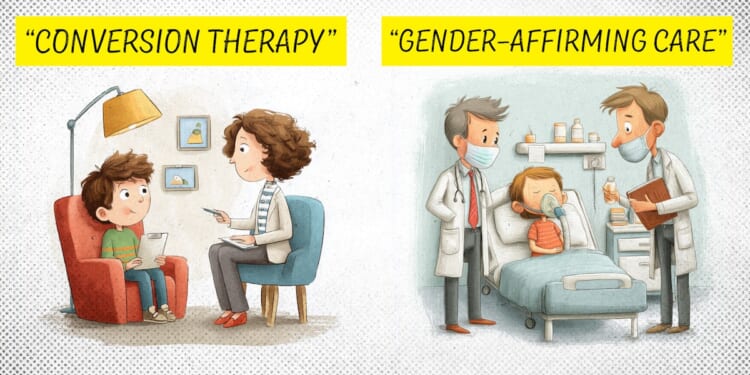For years, the term conversion therapy has been a dirty one. It’s a controversial practice of trying to fix someone’s sexual orientation, aiming to change people with homosexual inclinations to heterosexual through counseling, religion, or even shock therapy. Labeled as manipulative and harmful, it has since been banned in many states.
However, a growing number of people are now pointing out a strange irony: While we’ve banned one kind of conversion, we may be embracing another — just with new branding. The modern version isn’t about turning gay people straight. It’s about turning gay or even straight people transgender.
Only this time, instead of preachers or therapists using prayer or therapy to battle same-sex attraction, we now have doctors and psychologists using hormones and surgeries to “affirm” a new gender identity — sometimes in young people who might just be same-sex attracted or whose personality traits don’t align with traditional gender stereotypes. Critics argue that we’ve gone from “pray the gay away” to “trans the gay away” and “trans the biological reality away.”
And the issue isn’t just cultural anymore — it’s legal. The Supreme Court heard arguments on the subject this week.
This all comes to a head in the case Chiles v. Salazar, where the Supreme Court is reviewing Colorado’s ban on “conversion therapy” for minors. The law makes it illegal for licensed counselors to offer therapy aimed at changing a young person’s sexual orientation. The problem? The law also means that if a therapist questions a child’s desire to transition, or encourages them to accept their biological sex, that might count as illegal “conversion therapy.”
According to The Wall Street Journal, one of the big questions in the case is whether therapy counts as free speech. Can the state ban a therapist from saying certain things to a patient — like encouraging them to explore their feelings without jumping to medical intervention — just because the state disagrees with that point of view?
During oral arguments, several justices expressed concern that Colorado’s law is a form of speech censorship, not merely a ban on harmful medical practices. USA Today summed it up this way: The Court is trying to figure out whether states can “outlaw” certain viewpoints in therapy sessions without violating the First Amendment.
Justice Samuel Alito, for example, mused that Colorado’s law “looks like blatant viewpoint discrimination.”
Concurrently, the Court is also hearing another case about whether states can restrict “gender-affirming” medical care for minors — things like puberty blockers and cross-sex hormones that do the opposite of affirming. So, on one hand, they’re deciding whether you can ban talking about gender transitions, and on the other, whether you can ban performing them.
It’s hard to ignore the overlap.
When conversion therapy was common, the goal was to make gay people straight. Today, critics say the new goal — especially for young people struggling with anxiety, depression, and discomfort in their bodies — is to make “trans” people.
It’s not just speculation. Some detransitioners (people who transitioned and later reversed course) have said they realized in hindsight that they were actually same-sex attracted, not “born in the wrong body.” In other words, what used to be treated as “gay” is now being treated as “transgender.”
The Washington Examiner notes that the LGB is at odds with the T: “A contingent of gay rights groups sees ‘gender-affirming care’ as contemporary conversion therapy, coercing children to alter themselves physically into something they are not, instead of growing up gay.”
Here’s the strange contradiction at the heart of this debate: Some states outlawed therapy that tries to change sexual desires because they claim it’s harmful and coercive. But at the same time, those folks are encouraging medical interventions that turn someone transgender — often before they’re old enough to fully understand what’s happening.
In some cases, conversion therapy has been linked to trauma, anxiety, and depression. But so-called gender transition — especially when done on minors — can carry irreversible consequences, from infertility to lifelong medical dependence, along with the mental and emotional problems of past practices.
Ultimately, this Supreme Court case isn’t just about therapists in Colorado. It’s about free speech, government intervention, medical ethics, and how far our society will go in shaping people’s “identities.”

















